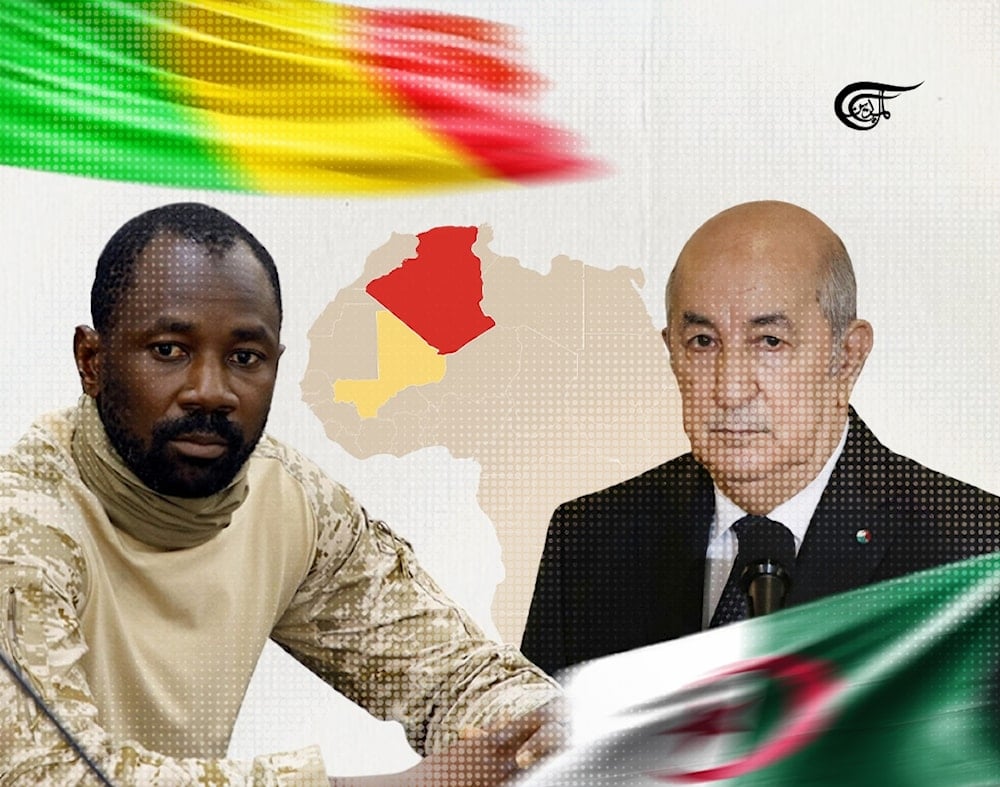Algeria and Mali, divided and almost conquered
Rosa Moro explores the sharp decline in Algeria-Mali relations after a disputed drone incident, amid wider geopolitical manipulation, misinformation, and escalating regional tensions involving Morocco, France, and Western interests.
-

The two countries need to sit down and resolve the crisis with maturity, to consider carefully that they could be being manipulated to be easily dominated. (Al Mayadeen English; Illustrated by Batoul Chamas)
Diplomatic relations between Algeria and Mali, and thus the Alliance of Sahel States, AES, have deteriorated sharply in recent weeks. These relations have long been strained due to their porous 1,400-kilometer border in the middle of the desert.
Since 2012, Mali has accused Algeria of harboring the ‘Tuareg rebels’ who launched the secessionist Azawad rebellion in January 2012, following the fall of Gaddafi’s Libya in late October 2011, which maintained a delicate balance between the peoples of the region.
Algeria pushed for the Algiers Peace Accords, signed on 1 March 2015, to establish peace between the Malian state and the northern separatists, the Front for the Liberation of Azawad, FLA, (formerly the National Movement for the Liberation of Azawad), but the Malian military junta of Assimi Goïta unilaterally suspended these agreements in January 2024. Mali accused Algeria of interference and of providing support to jihadist separatist leaders, criticizing Algeria for meeting with Tuareg leaders, considered by Bamako to be ‘terrorists’. For its part, Algeria has always rejected these accusations.
With recent events, the confusion is enormous, misinformation is rampant, and the need for calm is vital.
Two versions of the events
A communiqué published on May 1 by the Algerian Defense Ministry claimed that it had detected and shot down a "Malian armed reconnaissance drone", which "had infiltrated two kilometers into Algerian airspace." The events took place near the Algerian town of Tin Zaouatine, whose homonymous town is also on the Malian side.
Mali quickly launched an investigation, after which it claimed that the drone had been shot down in Malian airspace, stating that the wreckage of the drone was about 10 kilometers inside its territory, in the vicinity of the border town of Tin Zaouatine.
This incident led to the immediate closure of airspace between the two countries and the expulsion of their respective ambassadors, as well as those of Burkina Faso and Niger, Mali's allies.
Both governments accuse each other of aggression. Both insist that their version is the true one.
A few days later, information began to circulate on Malian social networks, which no one has been able to confirm, claiming that Algeria had shot down the reconnaissance drone to ‘protect’ Iyad AG Ghaly, an emblematic figure of the terrorist group Jama'at Nasr al-Islam wal Muslimin (JNIM), affiliated with Al-Qaeda in the Islamic Maghreb (AQIM).
At the same time, other speculations about the incident are circulating, due to the fact that on the same day as the Algerian Defense Ministry's communiqué, a few hours earlier, an FLA leader, Ataï Hag Mohammed, published images of a downed drone on X without giving any explanation. Some interpreted that it had been shot down by his rebel/terrorist group, others that the drone had crashed, and they had found it.
Apart from the speculation, which is getting wilder by the day, since then, the Malian press has focused on all of Algeria's problems and the Algerian press has focused on all of Mali's problems, adding fuel to the fire. And if one tries to understand what happened by reading the Western propaganda media, the task becomes impossible.
Western mainstream media analyses
Since the AES left the Economic Community of West African States, ECOWAS, (fully controlled by the West) in January 2024, according to Western commercial news agencies, the Sahel alliance has moved closer to Morocco (the bastion of the defence of Western and Zionist interests in Africa, along with Rwanda). This assertion is based on the assumption that the Sahelian countries have accepted Morocco's offer of access to the Atlantic through the port of Dakhla, located in occupied Western Sahara, which is to be operational by 2030.
The ministers of the ESA, in a meeting with the Alaouite king, listened and said they considered the offer interesting, but there has been no further official discussion on the subject. Although it is true that Morocco and Mali announced last February the “reinforcement of their military cooperation”, this did not include the entire AES, but only the Malian military junta, something that worried many in the AES itself and in the region, not only Algeria.
These approaches of asserting things that have not quite happened or generalising something individual must be put in the context of a disinformation project by the United Arab Emirates in coordination with Morocco. The UAE gave Rabat 15 million euros to finance a subversive campaign against Algeria in the Sahel. A fact brought to light by Algerian intelligence services at the end of 2023. As well as the European media's insistence that Algeria is losing influence in the Sahel and Morocco is gaining it. The commercial and mainstream media base this supposed increase in Moroccan influence, I insist, on cordial meetings with no real de facto consequences, perhaps induced by communiqués from interested agencies that reach their inboxes.
France will always join this disinformation scheme with priceless enthusiasm if it goes against Algeria.
On the other hand, the malefic French media Jeune Afrique and RFI go further, claiming that Algeria is worried about Mali's alliance with ‘Wagner's Russian mercenaries’ and that Algeria is worried about the expulsion of France and MINUSMA from Mali, because it could bring instability to the region... Algeria, the most anti-France nation on the continent, the largest importer of Russian arms in Africa, Russia's partner country that within OPEC has worked hand in hand to stabilize oil prices, a country that refuses to condemn ‘Russia's invasion of Ukraine’ and has applied to join the BRICS... all of this is very odd.
By the way, since 2023, Wagner has officially ceased to exist as such, its personnel depending on the Russian Ministry of Defense, which has excellent relations and alliances with Algeria. It is with France that Algeria has had problems, tensions, and disagreements of all kinds for centuries.
Analysts in the region
The analysis of the Moroccan writer and journalist, exiled in the Netherlands, Ali Lahrouchi, points to Morocco and ‘the Zionist entity’ in search of those responsible. He claims that all this must be linked to Morocco's military maneuvers, with the participation of the Zionist entity.
He is referring to the annual joint US-Moroccan military exercises “African Lion” which took place between April 14 and May 23 between Morocco, Ghana, Senegal, and Tunisia. Israeli troops, according to their own media, ‘only took part in the exercises in Morocco’, not in all the others.
In addition to bringing this novel and accurate factor into the analysis, Lahrouchi recalls the "fierce diplomatic and media campaign" waged by the French extreme right against Algeria. The Moroccan journalist considers that Mali's reaction has been "ill-considered" and that it could be being manipulated by a ‘big plot’ of outside powers.
For his part, analyst Saïd Bouamama pointed out on the Investig'Action YouTube channel that “the interests at stake in this crisis far exceed those of the two countries in question” and that “the interests of the US, France, Morocco and Israel are also very present in the crisis”, which “fits the agenda of the great powers” with huge economic and geostrategic interests in the area.
Bouamama locates the beginning of all border tensions in the French colonial plan, which strove to make the region independent in a balkanized manner, and then instrumentalized the Tuareg issue as a strategy of dividing in order to better control. France turned the region into a ‘Sahelistan’ with everyone against everyone else in order to keep them under its control.
Conclusion
Finally, I would like to recall here the exceptional nature of the Algerian state within the entire continent and the Arab countries. Algeria positions itself without circumlocution on the side of Palestine; it could be the only state in the whole continent, I believe, along with Djibouti, that has never ever recognized or made the slightest move toward “Israel”. Moreover, it is attempting to join the multipolar dynamic of the BRICS. Algeria is also an openly anti-NATO country that has often been excluded by French or UN ‘peace’ missions, precisely because of its firm anti-imperialist stance.
Everyone can draw their own conclusions from all these factors on the table, in addition to one that is always fundamental: Cui prodest (who benefits).
The two countries need to sit down and resolve the crisis with maturity; to consider carefully that they could be being manipulated to be easily dominated, that those who will benefit from the altercation will be the usual ones, and those who will lose will also be the usual ones: the peoples.

 Rosa Moro
Rosa Moro
 8 Min Read
8 Min Read











